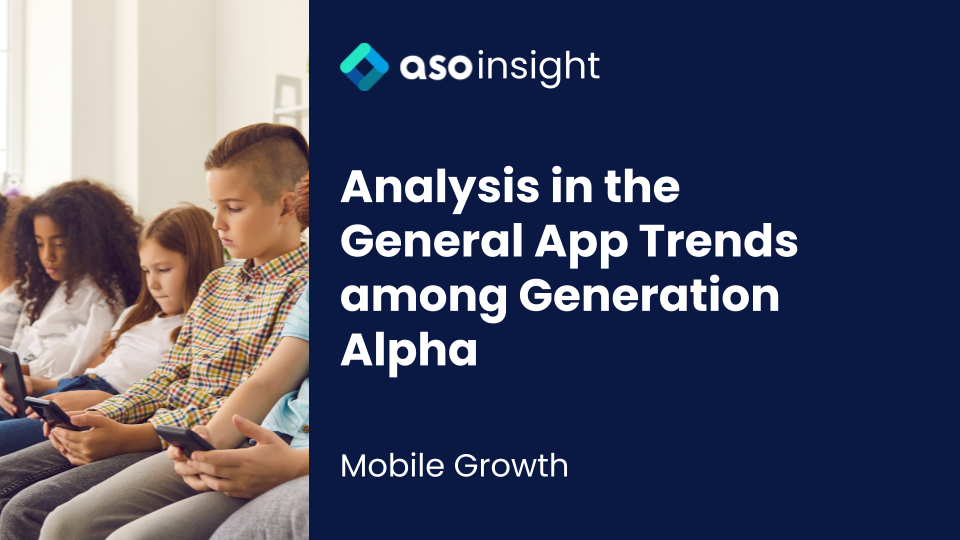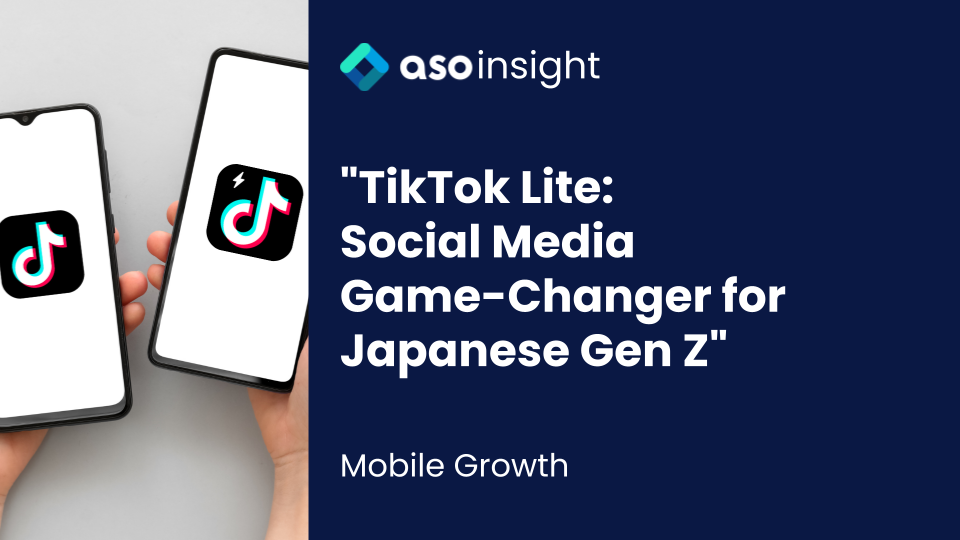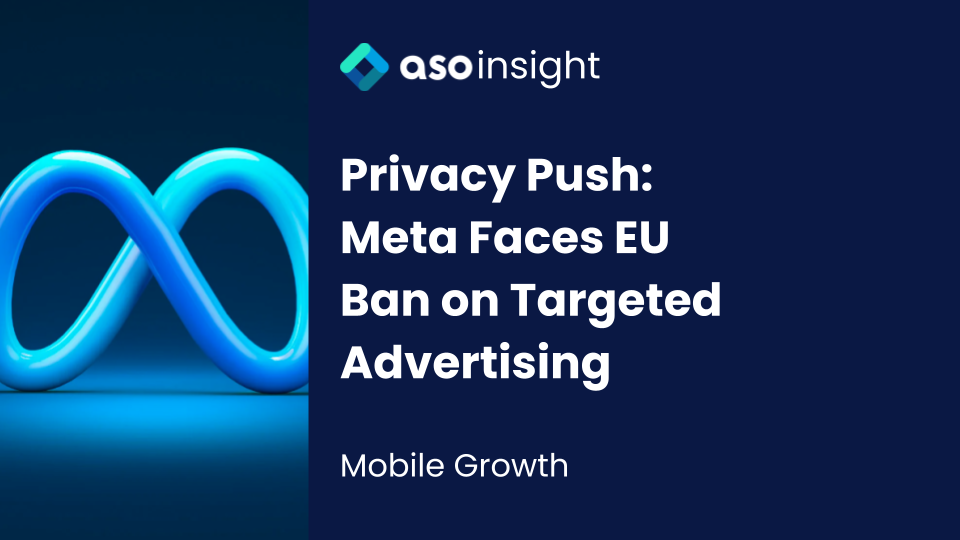Generation Alpha, born between 2010 and 2024 (McCrindle), is rapidly evolving along with ongoing technological development. This also indicates that Generation Alpha is no longer a subject of disinterest; in fact, individuals who belong to this generation are part of the most crucial consumers that marketers must analyze for new app marketing trends and strategies.
Contents
Characteristics of Generation Alpha
Generation Alpha is widely known for its tech-savvy traits. As the generation that initiated in the same year as the release of the first iPad as well as when the term, ‘app’ was popularized, Generation Alpha is predicted to be the leading group to future technology. However, technology is not the only trait that deserves attention; they have several characteristics to be taken into account.
Generation Alpha Appreciates Digital Interactions
Generation Alpha demonstrates a high tendency to appreciate digital interactions. This is a major consequence of the Covid-19 pandemic, where countless schools and households experienced a compulsory quarantine. The period of quarantine, henceforth, enhanced the general uses of online communication platforms and social media, instead of face-to-face connections. For such changes in the daily socialization method, app developers implemented various tools that enabled their apps to allow more authentic real-time communications, to an extent where users had sufficient experience socializing online in the virtual community consisting of other users worldwide. In fact, the concept of virtual community is still developing to fulfill the needs of the younger generation, most of whom feel more comfortable interacting with others virtually; one key instance of this virtual society is Metaverse, which is being incorporated into many social media and gaming apps that Generation Alpha utilize.
Generation Alpha Values Sustainability
According to the report by Wunderman Thompson, 63% of Generation Alpha expressed their interest in working to help save the planet (Fletcher). Furthermore, 81% of Generation Alpha’s parents remarked that their children have had an influence on their environmentally friendly consumption decisions and raised awareness of the ongoing environmental issues (McCrindle). The statistics highlight the likely fact that individuals within Generation Alpha are conscious of the future environment and sustainability.
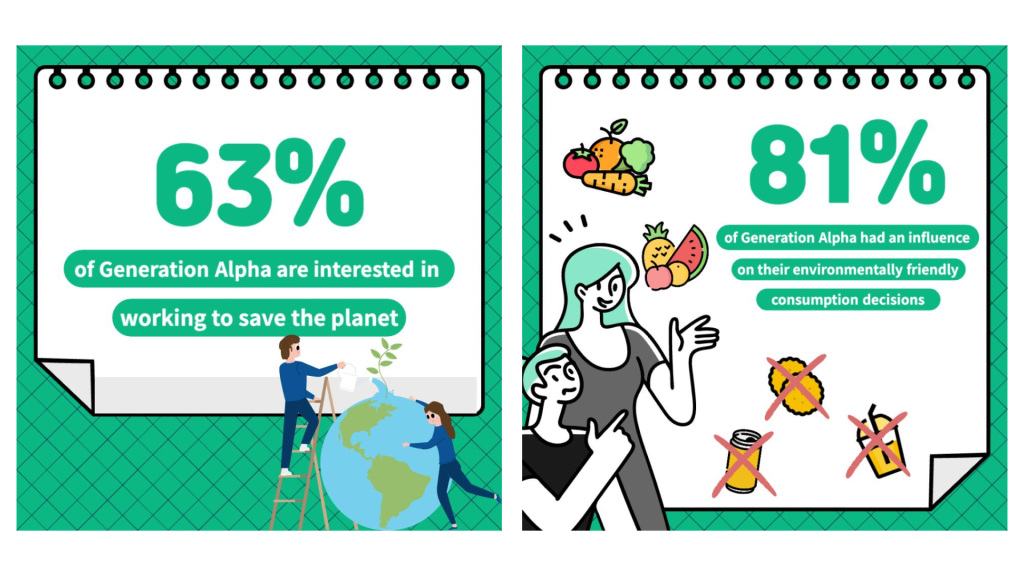
Generation Alpha Engages in Activism
Generation Alpha strongly believes that they can make a change in this world. Such values have already generated many young activists in diverse fields of controversy. Take the example of Kauã Rodolfo who, only at the age of 11, began speaking for protecting the planet by planting trees. As an ambassador of an organization, Plant-for-the-Planet, Rodolfo has continuously had a positive influence on the tree-planting campaign, which led to a million trees being planted within a few years of his activist actions. As can be seen, Generation Alpha does not only feel concerned about different global problems, but they also work to act against them.

Apps to target Generation Alpha
Social Media
With over 2 billion of the population predicted to be Generation Alpha in 2025, 87% of them use at least one social application daily, 68% of whom reportedly use YouTube, 44.2% on Tiktok, and 23.6% on Instagram (Walk-Morris). Such predominant social media apps have traits in common as compelling tools to captivate young Generation Alpha users.

The first characteristic of popular social media apps is their “fast-paced, easily consumable media content” (InspringApps). Since children in Generation Alpha are found to have shorter attention spans, they lean towards media content that sparks their interest and lasts for a very short time. Consequently, social media apps such as YouTube and Instagram designed and updated their apps to incorporate such user feedback by creating content called YouTube shorts and Instagram reels, where users can watch entertaining video contents that merely last up to 60 seconds or 90 seconds.

Due to the shorter concentration time that Generation Alpha demonstrated, these new approaches of implementing vertical content from social media platforms were proven successful. After introducing YouTube shorts to its users in 2020, the number of users increased by 25%—0.5 billion, most of which were from those within Generation Alpha—and its total revenue was raised by 90.7% over the subsequent 2 years (Demand Sage). Similarly, Instagram’s revenue increased by 178% within a year after introducing Instagram reels for its Generation Alpha users. Hence, easily digestible content is growing to become more popular over the years, particularly for Generation Alpha users who have relatively shorter attention spans.

Another prominent attribute of the fastest-growing social media apps is their support of Generation Alpha’s authenticity. Generation Alpha respects diversity and the expression of its own identity. Henceforth, they prefer to communicate within their personalized social networks, often by posting stories on Instagram, vlogs and unboxing videos on YouTube, and filming short trending challenges on TikTok. Furthermore, one of the fastest-growing social media platforms called BeReal attempted to apply a new type of user experience. With its simple design, BeReal allows its users to share a snapshot of their daily life at a random time of the day through a ‘Time to BeReal’ notification. The authentic functionality of the app as well as its quality of being ‘real’ are what made the app fascinating for the curious Generation Alpha users, allowing the app to see 313% growth in its consumer usage in 2023 (Hubspot).

In addition, from personal experience, there are differences in the preferences towards social media apps shown by Generation Alpha from various countries: mainly South Korea, Japan, and the United States. It is commonly observed that socializing cultures in South Korea and Japan are more conservative compared to those in the United States. Hence, while Korean and Japanese groups of Generation Alpha tend to conceal themselves from sharing every detail of their daily life and value individualism, those from the states lean towards forming a large community in which they could communicate with a wide range of followers and friend groups. Therefore, it may be predicted that major messenger apps such as KakaoTalk and Line will thrive in their respective countries—South Korea and Japan—due to their Generation Alpha’s tendency to appreciate tight yet smaller communities for socialization. On the other hand, more social media apps such as BeReal and Instagram would most likely continue to flourish for Generation Alpha users from the United States, as they are noticeably more keen on revealing short form content of their lifestyles to a greater number of their acquaintances.
From the aforementioned analysis of the trending social media platforms, it can be seen that marketing for a social media app to Generation Alpha users requires one to aim for unique yet simple UX and UI, while considering the generation’s short concentration spans and their value of being authentic among their online community. Evaluating these aspects plays an important role in raising the retention rate and lowering the bounce rate on a social media app.
Games and Entertainment
Not only through social media platforms, however, Generation Alpha constantly searches for other media where they could execute digital interactions and grow online relationships with one another. Out of many media, gaming apps particularly strive to attract Generation Alpha with their entertainment services linked with a concept of Metaverse, where users are able to interact with others in a virtual realm, instead of meeting each other face-to-face.
As early adopters, Generation Alpha seeks new technological advancement and updates on the apps that they frequently use. Therefore, introducing original update ideas to this generation may dramatically catch their interest in downloading the apps and leaving positive reviews. Take an example of the app, Roblox—one of the top four gaming apps that Generation Alpha utilizes, and a representative of an early Metaverse game. In the game, its user character is able to play within a virtual 3D environment along with other users’ characters. Taking reality into a simulation, users are also able to build their own worlds and games and provide them for other users to play online. These distinctive traits of Roblox have enabled the number of app users to soar over the past years among Generation Alpha.
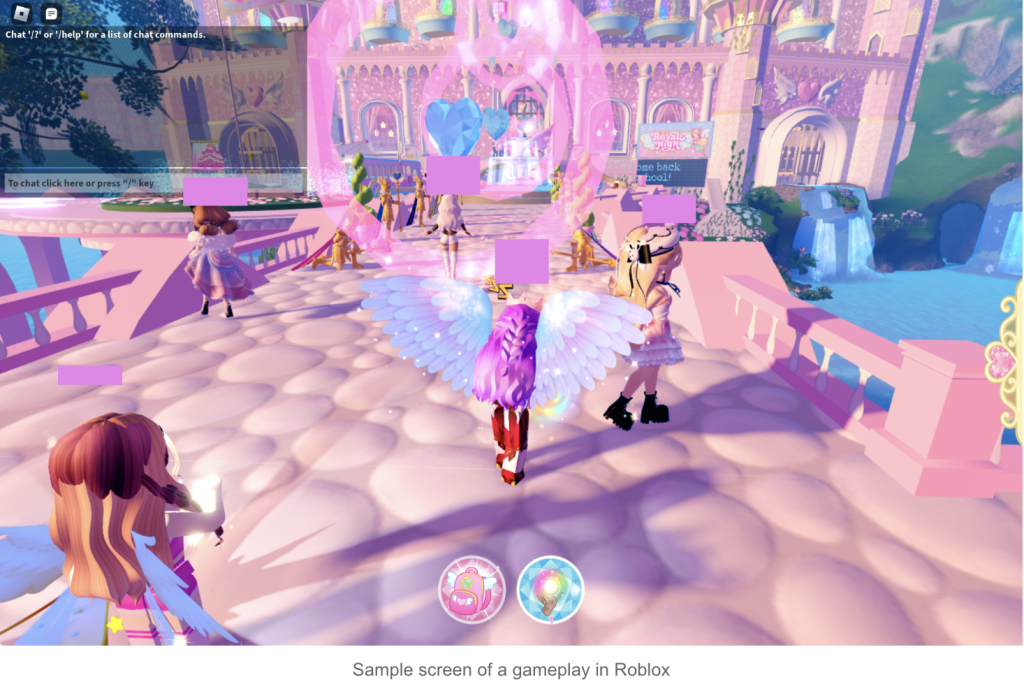
Other examples of games that share similar contents and Metaverse notions are Zepeto with over 300 million downloads last year, where its users customize their own avatars and invite their friends to explore the virtual community built by other users, WePlay, a party game largely consisting of younger users in Generation Alpha where its users assemble online to play various board games and interact using voice room, and Bondee, a newly developed app that functions in a very similar way as Zepeto.

However, it is noticeable that when keywords such as ‘metaverse’ and ‘virtual’ are searched in the App Store, the popular entertainment apps listed above are not placed on top of the page. From this, one can deduce that Generation Alpha does not tend to depend solely on the order of popularity that appear on the App Store and Google Play Store, but rather follow the trends and viral apps that their friends and influencers download and advertise.
Self-care
Generation Alpha values their physical and mental health as well, especially after facing the Covid-19 pandemic as well as their lasting sedentary lifestyles.
Resultantly, there were diverse apps developed that ensure a variety of health aspects for their users to guide them to a healthier lifestyle and promote better self-care. An example of such apps is MyRoutine, where users can set their daily life patterns that they aim to follow on a regular basis, and share their own routines with other users, just like social media. In particular, since Generation Alpha aspires to spread positive influence, a large portion of them also make good use of the MyRoutine app and other self-care apps alike.
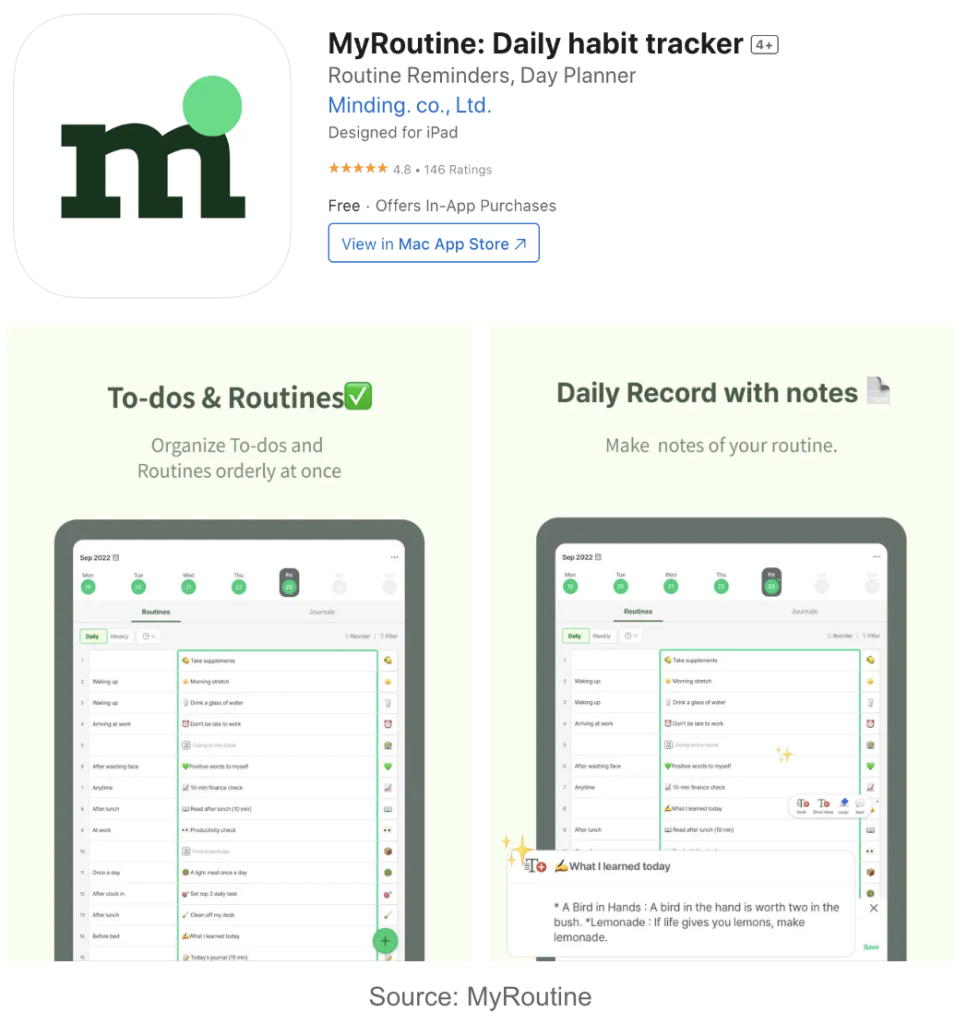
Moreover, there are other self-care apps such as those that encourage young Generation Alpha to become more productive in their studies. Though these apps may be limited to use by older students—mainly Gen Z users—they are still very popular among Generation Alpha as well. This is perhaps also due to how most of the study apps are associated with environmental movement organizations and sustainable development goals. One of the most well-known study apps is Forest, which users utilize as a Pomodoro timer, and it is a very novel app for Generation Alpha, as it allows users to collect trees to decorate their virtual forest, as well as to plant actual trees in accordance with the amount of time they spend being on task and recorded on the phone timer. With great care for the future environment, Generation Alpha is known to actively be a part of the app’s online community of students.
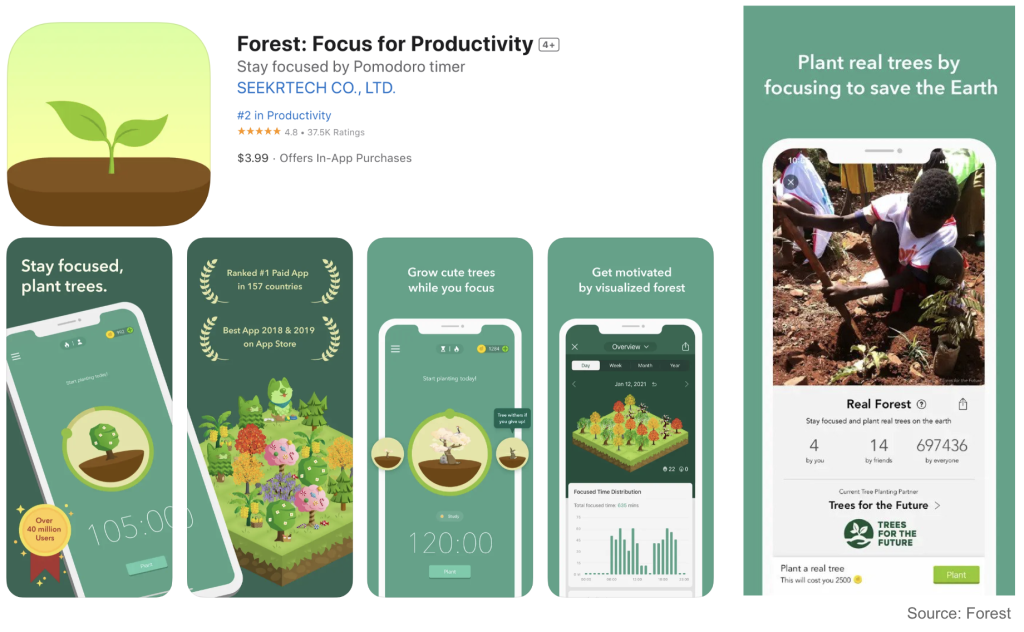
Millennials vs. Gen Z vs. Generation Alpha

Of course, there were other generations classified previously to Generation Alpha, the two most recent ones being the Millennials—born between 1981 and 1996—and Gen Z—born between 1997 and 2009.
Thoughts on Technological Development

The main difference between the Millennials, Gen Z, and Generation Alpha is their respective impressions of technological advancement.
Millennials, the eldest group of app users among the three generations, tend to recognize the limit of technology. This results in the Millennials averting their use of technology and keeping track of the time they regularly spend on the apps.

In contrast, as individuals who are relatively more familiar with technology, Gen Z and Generation Alpha do not show aversive nature towards technology; instead, both generations are exposed to a wide variety of technological devices. However, the noticeable difference between Gen Z and Generation Alpha is that, “[c]ompared to [G]en Z’s common social behaviors, [G]en [A]lpha is much more analogue”, according to Anna Pompilio; it is further supported by CMW, which emphasizes that “virtual and reality are interchangeable” for Generation Alpha, and that these individuals expect the real world to be as captivating as the virtual world, in which they may feel more comfortable engaging. This implies that Generation Alpha strives to connect the interactions in the real world with those in the digital domain, furthering the idea of expanding Metaverse and other virtual realms to attract Generation Alpha app users.
Approaching strategies for app marketing

One may suggest different methods to approach customers from each generation for app marketing.
Millennials highly tend to trust expert opinions on products, including apps. Therefore, approximately 44% of Millennials who believe in opinions from experts in particular areas of study would be inclined to download apps that are recommended by the professionals that they trust.
On the other hand, Gen Z and Generation Alpha progressively grow their tendency to trust influencers, when purchasing products or consuming on apps. This is especially true for Generation Alpha; more than half—55%—of Generation Alpha told in the survey that they like to purchase a product “if they see their favorite Instagram or YouTube star wearing or using it” (Fletcher). The statistics present the importance of influencers when marketing an app to younger generations including Generation Alpha.
Nonetheless, it is clear that all three generations—even the Millennials—are influenced by advertisements on “blogs and social networks”, according to Eminence, as Millennial users are found to be 2.5 times more influenced by these online social sites. Through this analysis, it is plausible to conclude that executing paid promotions of apps on various social media platforms is an extremely effective marketing strategy to attract new Millennial, Gen Z, and Generation Alpha users.
In particular, when attracting Generation Alpha users, apps may propose to make collaboration with other influencers—generally who are popular among Generation Alpha—for promotion. This would likely increase the number of app downloads, but may also raise profit when apps with in-app purchase or even paid downloads decide to promote their premium features that only unlock when users pay for them. Though this could be a risky attempt for start-up app companies with lower budgets, as a significant amount of money is expected to approach some universally-known influencers, it could be one of the most effective ways to increase the app downloads and profits from Generation Alpha.
Yet one important point to take into consideration when marketing apps for the current Generation Alpha users is that they are still of a very young age, ranging from 0 to 13 years old as of 2023. Thus, some of the approaching strategies outlined above may be limited to young users, or contrariwise, must be modified in an appropriate method to target young audiences. For instance, a possible issue that may obstruct apps from making prominent profits from Generation Alpha users is their lack of authority over economic activities due to their young age. In order to tackle this, app marketers may target another group of users: parents or guardians of their Generation Alpha users. Since parents and guardians hold relatively greater power to control money than their young children, app developers may include features on the app that could be appealing for not only their Generation Alpha users, but also their chaperones, most of whom are Millennials.
Thinking back to the first trait of the Millennials, it can be seen that they frequently express aversion towards technology, and thence this suggests that implementing a feature or a tool which allows keeping track of their children’s use of time on apps would acquire greater trust from Generation Alpha’s guardians. Through their reliability towards the app, the Millennials have a higher likelihood of getting involved in paid options provided by the app that could optimize the app experience for their Generation Alpha children.
Closing Thoughts
Though it is the same English that is used, whether, in an English class or an English base app store page, the language rules are different a little bit. In the end, the app stores’ system recognizes words as a combination of “0” and “1,” and the system doesn’t put its grammar correctness in priority. Rather, it prioritizes how that binary combination is related to its app and how often users use that combination on the search.
ASO, especially MKO, then, targets how the system calculates the relation between a keyword and the app and the search data. What a word means in real life can be found in a dictionary, but in app stores, it takes more than that needs a technical approach to find the “meaning” of the word in the context of the world of app stores. ASO consultancy, or an ASO tool, then, can be perfect dictionary for this purpose.
Though it is the same English that is used, whether, in an English class or an English base app store page, the language rules are different a little bit. In the end, the app stores’ system recognizes words as a combination of “0” and “1,” and the system doesn’t put its grammar correctness in priority. Rather, it prioritizes how that binary combination is related to its app and how often users use that combination on the search.
ASO, especially MKO, then, targets how the system calculates the relation between a keyword and the app and the search data. What a word means in real life can be found in a dictionary, but in app stores, it takes more than that needs a technical approach to find the “meaning” of the word in the context of the world of app stores. ASO consultancy, or an ASO tool, then, can be perfect dictionary for this purpose.
This article is written by Jiyu Kim, an aix’s marketing intern.
Benson, Claire. “The Consumers of Tomorrow, How Brands Need to Listen to Gen Alpha.” SDG Changemakers, SDG Changemakers, 5 Nov. 2021, www.sdgchangemakers.today/post/the-consumers-of-tomorrow-how-brands-need-to-listen-to-gen-alpha. Accessed 20 Aug. 2023.
Byun Hye-jin. “The Korea Herald.” The Korea Herald, 4 Mar. 2022, www.koreaherald.com/view.php?ud=20220304000645. Accessed 18 Aug. 2023.
CMW. “Generation Alpha: “More Gen Z than Gen Z” - CMW.” CMW, 26 Aug. 2021, www.c-mw.net/generation-alpha-more-gen-z-than-gen-z/. Accessed 30 Aug. 2023.
Cohen, Jamie. “How Yubo’s Creators Designed an App for Gen Z and Gen Alpha.” Forbes, 8 Apr. 2021, www.forbes.com/sites/jamiecohen/2021/04/08/how-yubos-creators-designed-an-app-for-gen-z-and-gen-alpha/?sh=5780d5133ac8. Accessed 12 Aug. 2023.
“Gen Z Influencer Marketing: What Marketers Should Know (2023).” Insense.pro, 2023, insense.pro/blog/gen-z-influencer-marketing#:~:text=Actually%2C%2044%25%20of%20Gen%20Z,expression%2C%20relatability%2C%20and%20authenticity. Accessed 19 Aug. 2023.
“Generation Alpha.” Wunderman Thompson, 2023, www.wundermanthompson.com/insight/generation-alpha-2019. Accessed 14 Aug. 2023.
“Generation Alpha : What Tools to Reach Children and Teenagers of the Future.” Digital Marketing Agency in Geneva Switzerland, 18 Nov. 2022, eminence.ch/en/generation-alpha-and-marketing-strategy/#gref. Accessed 20 Aug. 2023.
“Generation Alpha: 8 Eye-Opening Characteristics.” Student-Centered World: A Student-Centered Learning Resource, 5 July 2022, www.studentcenteredworld.com/generation-alpha/. Accessed 16 Aug. 2023.
“Generation Alpha’s Influence on Mobile Testing Priorities and the Higher Expectation of Quality.” Linkedin.com, 2022, www.linkedin.com/pulse/generation-alphas-influence-mobile-testing-priorities-loureiro-1f?trk=pulse-article. Accessed 23 Aug. 2023.
Gitnux. “Millennials on Social Media Statistics and Trends in 2023 • GITNUX.” GITNUX, GITNUX, 5 Apr. 2023, blog.gitnux.com/millennials-on-social-media-statistics/. Accessed 13 Aug. 2023.
Haynes, Megan. “55% of Gen Alpha Swayed by Social Stars.” Kidscreen.com, 2020, kidscreen.com/2020/03/12/55-of-gen-alpha-swayed-by-social-stars/. Accessed 17 Aug. 2023.
InspiringApps. “Designing Apps for Gen Alpha.” Inspiringapps.com, 2014, www.inspiringapps.com/Blog/165/designing-apps-for-gen-alpha/. Accessed 10 Aug. 2023.
---. “Designing for Gen Z.” Inspiringapps.com, 2014, www.inspiringapps.com/Blog/134/designing-for-gen-z/. Accessed 10 Aug. 2023.
---. “Designing for Generation X.” Inspiringapps.com, 2014, www.inspiringapps.com/Blog/17/designing-for-generation-x/. Accessed 10 Aug. 2023.
---. “Designing for Millennials.” Inspiringapps.com, 2020, www.inspiringapps.com/Blog/133/designing-for-millennials/. Accessed 10 Aug. 2023.
“Instagram Revenue and Usage Statistics (2023).” Business of Apps, 2 May 2023, www.businessofapps.com/data/instagram-statistics/. Accessed 15 Aug. 2023.
Iskiev, Maxwell. “The Fastest Growing Social Media Platforms of 2023 [New Data].” Hubspot.com, HubSpot, 10 Apr. 2023, blog.hubspot.com/marketing/fastest-growing-social-media-platforms. Accessed 13 Aug. 2023.
---. “The Fastest Growing Social Media Platforms of 2023 [New Data].” Hubspot.com, HubSpot, 10 Apr. 2023, blog.hubspot.com/marketing/fastest-growing-social-media-platforms. Accessed 15 Aug. 2023.
Laura Porto Stockwell. “Three Things We Know about Generation Alpha - Laura Porto Stockwell - Medium.” Medium, Medium, 19 July 2022, lauraportostockwell.medium.com/three-things-we-know-about-generation-alpha-791b1826b8e9. Accessed 18 Aug. 2023.
McNamee, Jenna. “Gen Alpha Banking Does a Mashup of the Digital and Physical World.” Insider Intelligence, Insider Intelligence, 28 Sept. 2022, www.insiderintelligence.com/content/gen-alpha-banking-digital-physical-world. Accessed 17 Aug. 2023.
“Social Media, Generation Alpha and New Patterns of Influence.” Wunderman Thompson, 2019, www.wundermanthompson.com/insight/social-media-gen-alpha-new-patterns-of-influence. Accessed 14 Aug. 2023.
“The Future of Sustainability for Gen Alpha - McCrindle.” McCrindle, 18 Aug. 2021, mccrindle.com.au/article/topic/generation-alpha/the-future-of-sustainability-for-gen-alpha/. Accessed 17 Aug. 2023.
“The Top 15 Social Media Platforms Gen Alpha Uses - YPulse.” YPulse, 15 Feb. 2023, www.ypulse.com/article/2023/02/15/the-top-15-social-media-platforms-gen-alpha-uses/. Accessed 12 Aug. 2023.
“Understanding Generation Alpha - McCrindle.” McCrindle, 5 July 2022, mccrindle.com.au/article/topic/generation-alpha/generation-alpha-defined/. Accessed 20 Aug. 2023.
Walk-Morris, Tatiana. “Over Half of Gen Alpha Watch Shopping Content: Report.” Retail Dive, 16 Mar. 2023, www.retaildive.com/news/gen-alpha-watch-shopping-content-report/645177/#:~:text=Morning%20Consult’s%20report%20noted%20that,engaging%20in%20online%20product%20discovery. Accessed 17 Aug. 2023.
Washington. “12 Kids Who Are Changing Their Communities and Our World.” Washington Post, The Washington Post, 11 Apr. 2020, www.washingtonpost.com/kidspost/2020/04/11/12-kids-who-are-changing-their-communities-our-world/. Accessed 15 Aug. 2023.
“What Are the Most Visited Social Media Platforms among Gen Z?” Comscore, Inc., 2022, www.comscore.com/Insights/Blog/What-are-the-most-visited-social-media-platforms-among-Gen-Z. Accessed 14 Aug. 2023.
Yoganarasimha, Krishna, and hoomale. “10 Social Media Habits of Generation Alpha in 2023.” Generation Alpha, Hoomale, 11 Mar. 2023, hoomale.com/10-social-media-habits-of-generation-alpha-in-2023/#:~:text=Marketers%20are%20keen%20to%20tap,WhatsApp%20to%20communicate%20with%20friends. Accessed 14 Aug. 2023.
“YouTube Revenue and Usage Statistics (2023).” Business of Apps, 2 Aug. 2023, www.businessofapps.com/data/youtube-statistics/. Accessed 15 Aug. 2023.


